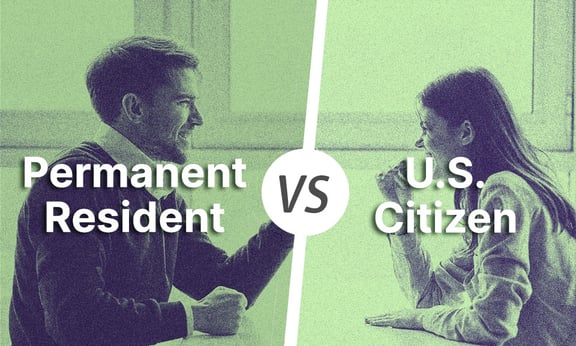If you are a lawful permanent resident (green card holder) in the United States, you might be wondering what are the benefits of becoming a US citizen. It comes with many rights and advantages that are not available to non-citizens. On the other hand, U.S. citizenship is not only a privilege but also a responsibility.
Read this article to explore some of the benefits of US citizenship and how you can obtain it.
What is the Citizenship of the United States?
Citizenship of the United States is a legal status that grants a person certain rights and obligations under the U.S. Constitution and laws. U.S. citizens are also members of a national community that shares a common history, culture, and values.
You can adopt two methods to become a U.S. citizen: by birth, or by naturalization.
You are a U.S. citizen by birth if you were born in the United States or its territories, or if you were born abroad to at least one parent who was a U.S. citizen at the time of your birth.
You can also become a U.S. citizen by naturalization, which is a process of applying for and obtaining nationality after meeting certain US citizenship requirements for Green Card holders.
See also: How to Become a US Citizen?
Benefits of US Citizenship
As a U.S. citizen, you can enjoy many benefits that are not available to non-citizens, such as:
– Voting in federal, state, and local elections. Only U.S. citizens can vote and have a say in how the government is run and who represents them.
– Bringing your family members to the United States. U.S. citizens can sponsor their parents, spouses, children, and siblings for permanent resident status without waiting for a visa number to become available.
– Obtaining nationality for children born abroad. Usually, children of U.S. citizens who are born abroad automatically acquire U.S. nationality at birth.
– Traveling with a U.S. passport. A U.S. passport allows you to travel to more than 180 countries without a visa or with a visa on arrival. It also enables you to get assistance from the U.S. government when you are outside the United States.
– Receiving government benefits. U.S. citizens are eligible for various federal benefits and programs, such as Social Security, Medicare, Medicaid, unemployment insurance, food stamps, and student loans.
– Working in government jobs. Many federal, state, and local government jobs require U.S. citizenhood as a condition of employment.
Read more about Employment-Based Green Card options.
– Running for public office. Only U.S. citizens can run for elected positions at the federal, state, and local levels.
Responsibilities of the U.S. Citizen
Along with the benefits of US citizenship come certain responsibilities that you must fulfill as a member of the national community, such as:
– Giving up all prior allegiance to any other nation or sovereignty
– Taking an oath of allegiance to the US and its Constitution
– Serving the country when required, such as by serving in the military or on a jury
– Participating in the political process by registering and voting in elections
– Respecting the rights and opinions of others
– Paying taxes and following the laws
– Contributing to your community and society
How to Obtain the U.S. Citizenship?
If you are not a U.S. citizen by birth, you can apply for naturalization after meeting certain eligibility requirements.
What are the U.S. Citizenship Requirements for Green Card Holders?
To be eligible for naturalization, you must:
– Be at least 18 years of age when you are filing your application
– Be a lawful permanent resident (green card holder) for at least five years (or three years if married to a U.S. citizen)
– Have a physical presence in the United States for at least half of the required residence period
– Have good moral character and not have committed certain crimes or violations
– Have basic knowledge of the English language and U.S. history and government
– Be willing to take an oath of allegiance to the United States
What is Naturalization?
Naturalization is the process of acquiring citizenhood or nationality of the U.S. legally. You need to make an application in the prescribed format to complete the process.
Learn more: What is Naturalization?
The US citizenship naturalization process involves several steps:
– Filing an application form (Form N-400) with supporting documents and fees
– Taking a biometrics appointment to provide your fingerprints, photograph, and signature
– Taking an interview with a USCIS officer to verify your identity, eligibility, and knowledge of English and civics
– Taking an oath of allegiance to the United States at a naturalization ceremony
What are the Rights of the U.S. Citizen After Naturalization?
After you take the oath of allegiance, you become a full-fledged U.S. citizen possessing all the rights and responsibilities laid under the Constitution. You can:
– Apply for a U.S. passport and travel freely
– Vote during the local, state, and federal elections
– Sponsor your family members for permanent resident status
– Apply for nationality for your children who are born abroad
– Receive government benefits and programs
– Work in government jobs and run for public office
You can be a sponsor for your spouse, children, and parents as an immediate family which takes much less time. For other relatives, they are categorized in preferences.
Green Card vs US Citizenship
Many lawful permanent residents (green card holders) wonder whether they should apply for U.S. nationality or not. While both statuses offer many benefits, there are some differences that you should consider before making your decision.
The main advantages of US citizenship over Green Card are:
– Voting Rights
Only U.S. citizens can vote in local, state, and federal elections.
– Family Sponsorship
U.S. citizens can sponsor more relatives for permanent resident status than green card holders, and they have shorter waiting times for visa availability.
Learn more about Family-Based Green Cards
– Citizenship for Children Born Abroad
Children born abroad to U.S. citizens automatically acquire U.S. residency at birth, while children born abroad to green card holders may not be eligible for U.S. citizenship depending on various factors.
– Travel Restrictions
Green card holders must maintain their residence in the United States and cannot stay outside the country for more than six months without risking their status. They also need visas to travel to certain countries. U.S. citizens can travel freely without any time limits or visa requirements.
– Government Benefits and Programs
Some federal benefits and programs are only available to U.S. citizens, such as Social Security, Medicare, Medicaid, unemployment insurance, food stamps, and student loans.
– Government Jobs and Public Office
Many federal, state, and local government jobs require U.S. nationality as a condition of employment. Only U.S. citizens can run for elected positions at the federal, state, and local levels.
– Deportation Risk
Green card holders can lose their status and be deported from the United States for various reasons, such as committing a serious crime, voting illegally, or abandoning their residence. U.S. citizens cannot be deported unless they obtained their nationality fraudulently.
Benefits of US Citizenship include that US citizens cannot be deported unless they obtained their citizenhood fraudulently.
– Tax Obligations
Both green card holders and U.S. citizens must pay taxes on their worldwide income to the U.S. government. However, advantages of US citizenship include that U. S. citizens may be subject to additional taxes or reporting requirements if they have foreign assets or income.
FAQs about the U.S. Citizenship
What are the pros and cons of U.S. citizenship?
U.S. nationality has pros such as voting rights, travel benefits, and family sponsorship, and cons such as tax obligations, jury duty, and possible loss of original nationality.
What are the Full Rights of the US Citizenship?
The full rights of U.S. residency include the right to live and work in the U.S., the right to vote, the right to travel, the right to federal benefits, the right to family sponsorship, and the right to residentship for children.
How Long Does it Take to Become a U.S. Citizen?
The time it takes to become a U.S. citizen varies depending on several factors, such as your location, the number of applicants, the complexity of your case, and the availability of USCIS resources. Generally speaking, it can take anywhere from six months to two years or more from the time you file your application to the time you take your oath of allegiance.
How Much Does it Cost to Become a U.S. Citizen?
The current filing fee for naturalization is $725, which includes $640 for the application fee and $85 for the biometrics fee. You may also need to pay additional fees for other services or documents, such as translation, photocopying, medical examination, and legal representation.
Can I Have Dual Citizenship?
The United States does not formally recognize or prohibit dual residentship. However, when you become a U.S. citizen, you must take an oath of allegiance to the United States and renounce any previous allegiance to any other nation or sovereignty. This does not necessarily mean that you will lose your original residency, as that depends on the laws of your country of origin.
Can I Lose my U.S. Citizenship?
You can lose your U.S. nationality only if you voluntarily renounce it or if you obtained it fraudulently or illegally in the first place.
How Can I Prepare for the Naturalization Test?
The naturalization test consists of two parts: an English test and a civics test. The English test evaluates your ability to read, write, speak, and understand basic English. The civics test evaluates your knowledge of U.S. history and government.
Categories




